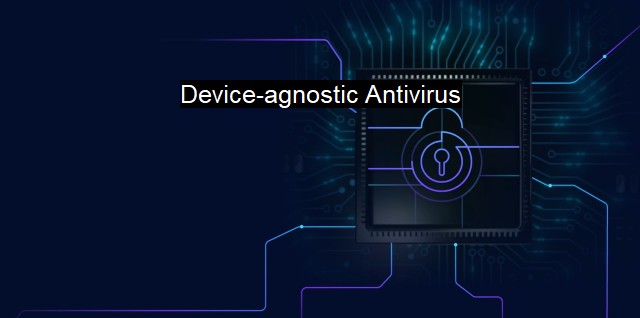What are Device-agnostic Antivirus?
Do You Need a Device-Agnostic Antivirus for Optimal Cybersecurity in the Digital Age?
Device-Agnostic Antivirus, in its simplest form, can be understood as a type of antivirus software or application that functions irrespective of the device or operating system it is applied on. In the realm of cybersecurity and antivirus technologies, the device-agnostic approach has emerged as a powerful vector of protection against digital threats and system vulnerabilities.Traditionally, devices have been shielded by cybersecurity systems that were designed specifically for a particular variety of software, such as Windows, Linux, or macOS. in today's era of exponential technological growth, where data is siloed across multiple platforms, including smartphones, tablets, computers, and cloud servers, it's critical to have a unified protection methodology.
A device-agnostic antivirus best suits this environment. It acts similar to an umbrella that promises to shield many kinds of devices from the brewing storms of malware invasion, phishing attacks, and other virulent digital ploys by malicious actors.
Examining more closely, device-agnostic antivirus looks beyond platform specifics and approaches malware protection with a universal lens. The designers of this sort of antivirus software focus on developing algorithms and security protocols that effectively interpret threats on a wide range of devices. This capability promises consistency of protection, smoother integration, and broader reach, providing a comprehensive immunity sphere against security threats.
The device-agnostic approach offers many other benefits as well. Since it operates using a holistic, platform-non-specific methodology, there is the elimination of a need for multiple, separate cyber protection software. This is particularly beneficial for organizations that deploy heterogeneous assortment of devices. These organizations can be relieved from the strenuous task of managing and coordinating distinct systems for each device.
Device-agnostic antivirus often functions in a real-time manner with automated updates and advanced threat detection methodologies. This makes them capable of handling zero-day threats, those threats that take advantage of vulnerabilities unknown to the vendor.
Device-agnostic antivirus does come with challenges. The fundamental does not lie in making the software versatile but lies in making it equally effective on various platforms. the diversity in devices introduces the risk of unexpected security loopholes. Hence, the success of a device-agnostic antivirus pivots on robust coding that anticipates variability and continually upgrades its threat-detection database to keep pace with the dynamism of cyber threats.
Creating a balance between universal functionality and device optimization is another challenge. For instance, mobile devices have more restriction on resource usage than a personal computer, thus the antivirus software needs to work optimally without draining battery life or taking up much-needed system resources.
Device-agnostic antivirus represents an amplifier of cybersecurity and antivirus protection that extends across all devices and platforms. Its rise is a response to the fragmented, interconnected, multi-device landscape that contemporary users and organizations navigate. With its universal coverage, automated security provisions, and user-friendly integrations, device-agnostic antivirus is a mighty tool in the battle against cyber threats. Despite the challenges, with a conscious balance of device sensitivity and threat robustness, it promises to become the gold standard of online security.

Device-agnostic Antivirus FAQs
What does "device-agnostic antivirus" mean?
Device-agnostic antivirus refers to an antivirus software that can be used on any device, regardless of its operating system or platform. It means that the antivirus can protect your computer, smartphone, tablet or any other device, without the need for a specific version of the software.What are the benefits of using device-agnostic antivirus?
The benefits of using device-agnostic antivirus include being able to use the same software across all your devices, regardless of their operating system. This can save you money, time, and effort in managing multiple antivirus programs. It also ensures consistent and reliable protection for all your devices, as the same antivirus software is used across all of them.Are device-agnostic antiviruses less effective than platform-specific ones?
Not necessarily. While some platform-specific antivirus software may have features unique to their platform, device-agnostic antivirus software can still provide effective protection. In fact, device-agnostic antivirus software may be more effective in detecting and protecting against cross-platform threats that can affect multiple devices that are not protected by the same antivirus software.Is it necessary to have device-agnostic antivirus software?
It is highly recommended to have device-agnostic antivirus software, as it provides consistent protection across all your devices, regardless of their operating system or platform. With the growing number of cross-platform threats and cyberattacks, it is essential to have reliable antivirus software that can protect all your devices. Additionally, having a single antivirus software for all your devices simplifies management and can save you money in the long run.| | A | | | B | | | C | | | D | | | E | | | F | | | G | | | H | | | I | | | J | | | K | | | L | | | M | |
| | N | | | O | | | P | | | Q | | | R | | | S | | | T | | | U | | | V | | | W | | | X | | | Y | | | Z | |
| | 1 | | | 2 | | | 3 | | | 4 | | | 7 | | | 8 | | |||||||